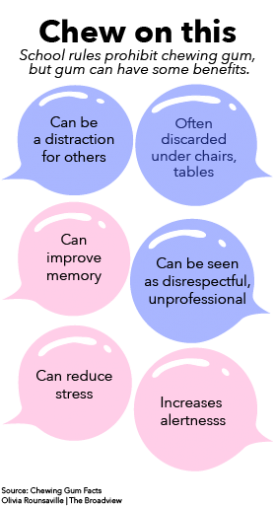‘Gum is dumb’
Sticky situation surrounding school ban

November 12, 2019
Smacking, popping, and blowing bubbles of gum at school may seem like an innocuous activity, but it may leave an unfavorable impression on visitors and members of the school community.
“We have hundreds of college admissions reps that are watching our students and paying attention to how they are presenting themselves,” Head of School Rachel Simpson said. “I have heard from at least one college admissions rep that it is a bad look that they are not looking for.”
The High School Student/Parent Handbook states that “gum, food or drink (other than water) is not allowed in class meetings” and that “food items, gum and eating are not permitted” in special liturgies and Mass. Faculty often remind students that gum is not allowed on campus and enforce this rule with the phrase, “gum is dumb.”
“In certain situations, if you’re talking to somebody or giving a presentation, it can be disrespectful to chew gum,” senior Zoe Forbes said. “The smacking can be really distracting, and the image of gum chewing also isn’t great.”
Despite the handbook rules, research shows that students can benefit from chewing gum as it can stimulate memory during tests, and it serves as a way to fidget and increase focus because it increases neurotransmitter levels which is helpful for students who have ADHD according to ADDitude.
“I have a hard time doing one thing at a time,” sophomore Finley Simon, who has been diagnosed with ADHD said. “It helps keep my body busy so I can focus better.”
In an experiment at St. Lawrence University with 244 undergraduate students, those who chewed gum remembered up to 50% more than those who did not, according to Live Science.
“I definitely think chewing gum helps me focus so I usually chew gum when I’m doing my homework,” freshman Molly Darling said. “It helps me to not get distracted by other things.”
Simpson is aware of the benefits of chewing gum during testing, but says she often sees students generally chewing gum throughout the day, instead of specifically for a test. Students may request a learning accommodation for gum chewing, according to Simpson.
“I think of our school environment as our workplace,” Simpson said. “When we mean business in our workplace, we want to present the most professional look in our dress and our body language. I think that gum is a form of body language.”










ximena Allub • Dec 18, 2023 at 11:59 am
There are always students with misophonia for whom the sound of chewing gum can be a trigger to their anxiety response. If there is an accommodation for students to use gum for better concentration, there should be an accommodation for the student who gets distrcated by the noises caused by chewing gum. I persoanly, find it lax and not professional.